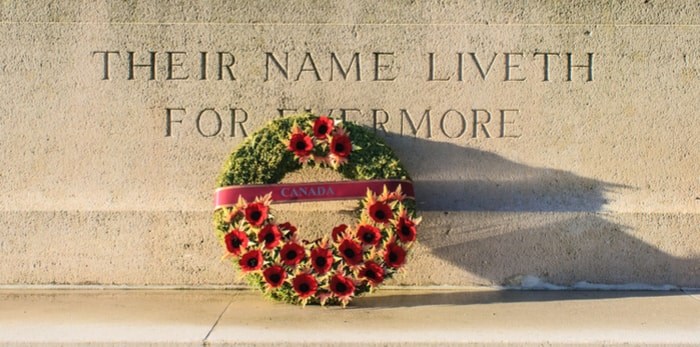 Remembrance Day wreath/Shutterstock
Remembrance Day wreath/Shutterstock
Every year on Remembrance Day, I lay a wreath at the Confederation Park Cenotaph in north Burnaby in memory of my father, Donald Evans. He was a navigator on a Lancaster bomber during World War II, was shot down, hidden by the French resistance and liberated by the British Army in September 1944.
When I was growing up he rarely mentioned his war-time experiences indicating he hadn’t done very much just doing his duty. Later when he began to contemplate his own demise he began to talk more and I began to realize how miraculous his survival had been.
On the night he was shot down his squadron, RAF 106 squadron, lost 5 of 16 aircraft and 3 of those exploded as a result of flak direct hits killing all on board. His aircraft was attacked over the target by a night fighter and turned for England badly damaged with 2 engines on fire. They made it half way to the coast before bailing out when they realized they couldn’t keep the plane in the air any longer. He bailed out when the plane was very low and hit the ground hard as his parachute had barely opened injuring his back and leg. He was picked up and hidden by the resistance.
His crew members were all captured and spent the rest of the war as POWs.
In 1989 I took him to France to look for the people who had hidden him and amazingly we found the old farmer (young in 1944) and his wife who had hidden him. It was a very emotional reunion after 45 years. Recently I came upon the following statement in a book by English historian Max Hastings “Among every hundred RAF Bomber Command aircrew in the course of the war, fifty-one died on operations, nine were lost in crashes in England, three seriously injured, twelve taken prisoner, one was shot down and escaped capture, and just twenty-four completed a tour of operations (30 missions).”
The odds my father faced were even worse as he told me that when he joined 106 squadron early in April 1944 no crew had completed a tour in over a year. He used to tell me that he had been living on borrowed time since 1944 and I now realized he wasn’t exaggerating. His survival (he lived to the age of 87) was truly miraculous.
Garth Evans, Burnaby


